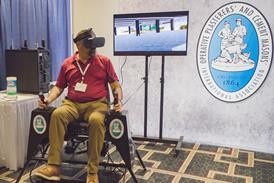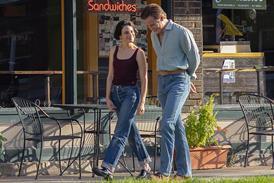Dir: Carlos Saura. Spain-Germany-Mexico. 105 mins.
Bunuel And King Solomon's Table (Bunuel Y La Mesa Del Rey Salomon) closed September's San Sebastian International Film Festival with a resounding thud. One influential local critic called it "probably the worst Saura has made," proving that the combination of a respected veteran filmmaker (Carmen, Goya In Bordeaux), fertile source material and solid production backing don't necessarily spell critical success, even at home. Nevertheless, international sales handler Filmax can expect some arthouse and ancillary business thanks to the Saura name and marketability of the film's plot, which involves legendary Spanish filmmaker Luis Bunuel and his friends, the painter Salvador Dali and poet Federico Garcia Lorca, in a fantastical, time-warping mystery.
With such rich inspiration - not to mention beloved cultural figures at stake - expectations in Spain were particularly high for Solomon, meaning disappointment may also get exaggerated. The film does have merits, including its sheer inventiveness and entertaining allusions to the oeuvres of its three protagonists. But Saura and co-scripter Agustin Sanchez Vidal seem to have lost their way as to whether they were crafting an arthouse mystery or an Indiana Jones-inspired action-adventure, and the end result is likely to leave audiences of both genres dissatisfied.
The fictional premise is what an aging Bunuel (Spanish showman Wyoming, greatly subdued) might have envisioned if he'd been asked to create a film starring himself, Dali and Lorca before he died. Bunuel dreams up a film within the film set in the modern-day and starring three handsome actors dressed in dapper mid-century suits as youthful versions of Bunuel (an excellent Arquillue), Dali (an underused Alterio) and Lorca (a bland Collado). The three are cognizant they are acting in a film yet they have no script and don't know the plot - an intriguing set-up which could have been better exploited but does allow for moments of self-referential humor such as one early scene where Lorca rightfully complains, "These dialogues are a little stiff."
One by one they get wrapped into a mysterious underworld of shady characters representing the three historical pillars of Spanish culture - Arabs, Jews and Christians - all of whom are vying to unearth the magical, Lost Ark-esque Table of King Solomon. In a key midway scene, each of the actors is forced to face the demons and dreams of his character's youth: Bunuel beds a mysterious blond then awakens to a violent mob; Dali must confront his ailing father; and Lorca dances flamenco with two handsome men in his native Andalucia.
The sequences reflect the best and worst of Saura's picture: it is wrought with historical, cultural and religious symbolism which may be interesting on an intellectual level, but fails to congeal into a solid, film-worthy script and is likely to be confusing to many viewers. A series of convoluted story twists push the film's biggest potential strength, the characters themselves, to the sidelines. The actors are thus reduced to portraying three of Spain's most colorful historical figures in cliches, with Bunuel mixing martinis, Dali playing with his upturned moustache and Lorca dully reciting his own poetry.
Prod cos: Rioja Films, Centre Promotor de la Imatge, Castelao Productions, Road Movies, Altavista Films
Spain distrib: Filmax
Intl sales: Filmax
Exec prod: Jose Antonio Romero
Scr: Carlos Saura, Agustin Sanchez Vidal
DoP: Jose Luis Lopez Linares
Prod des: Luis Ramirez
Ed: Julia Juaniz
Music: Roque Banos
Main cast: Gran Wyoming, Pere Arquille, Ernesto Alterio, Adria Collado

















No comments yet